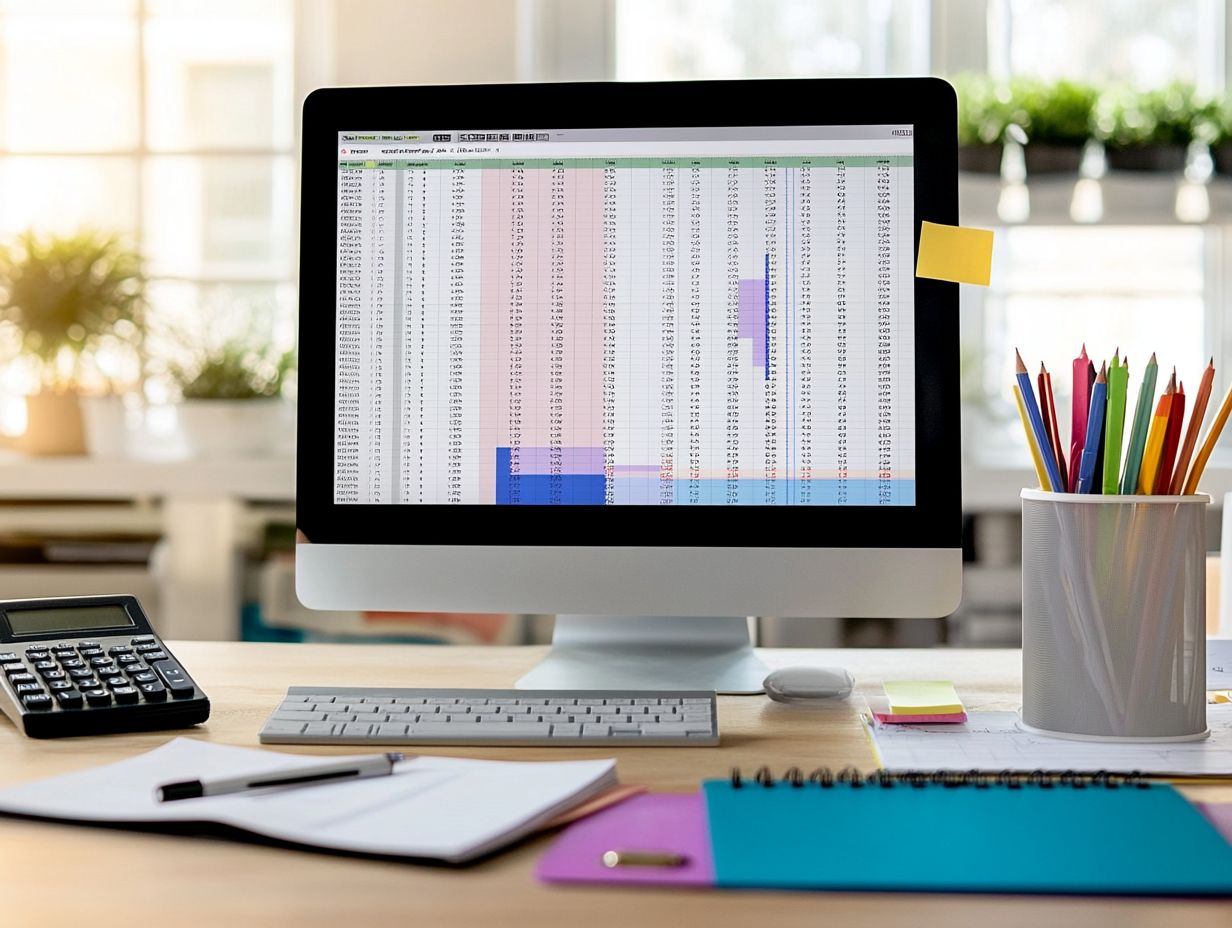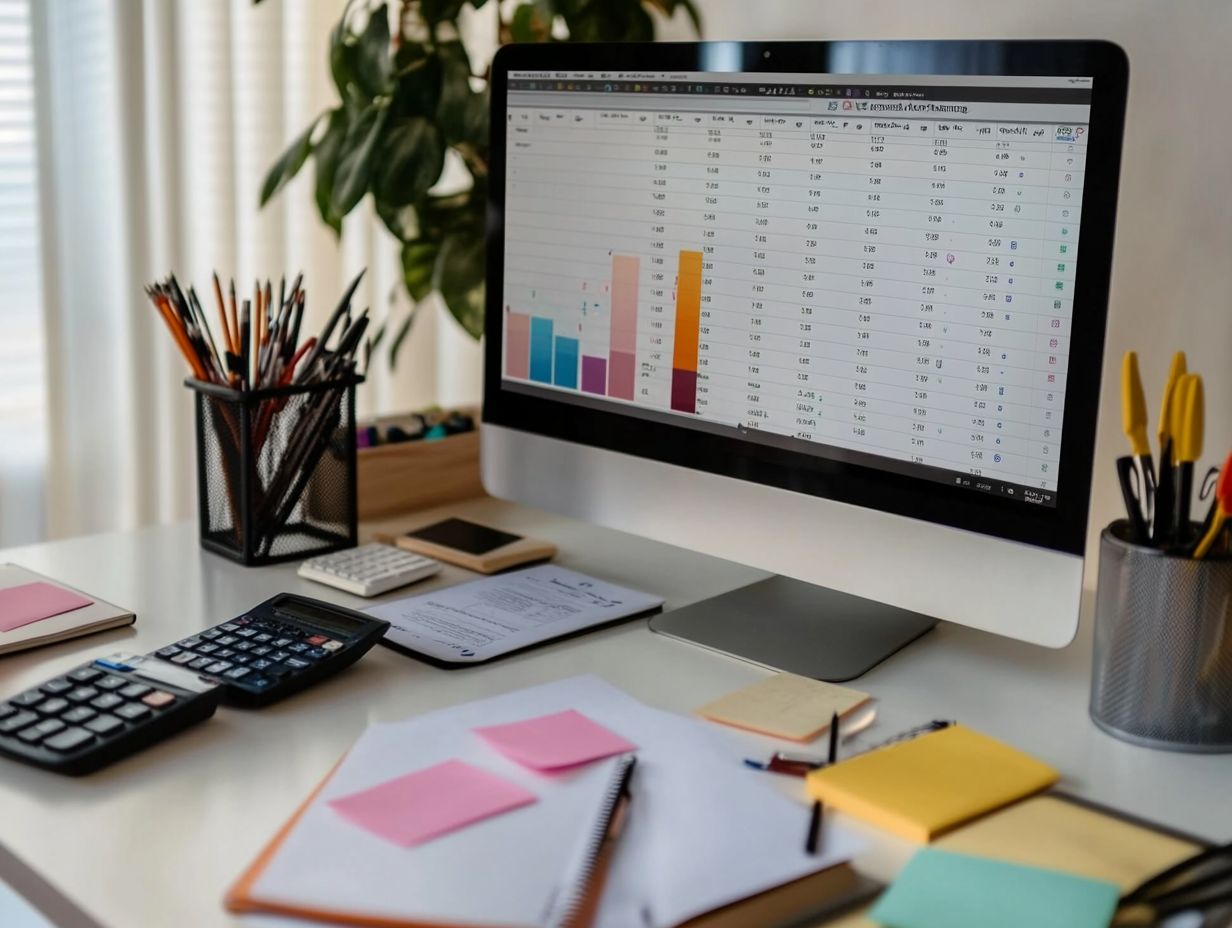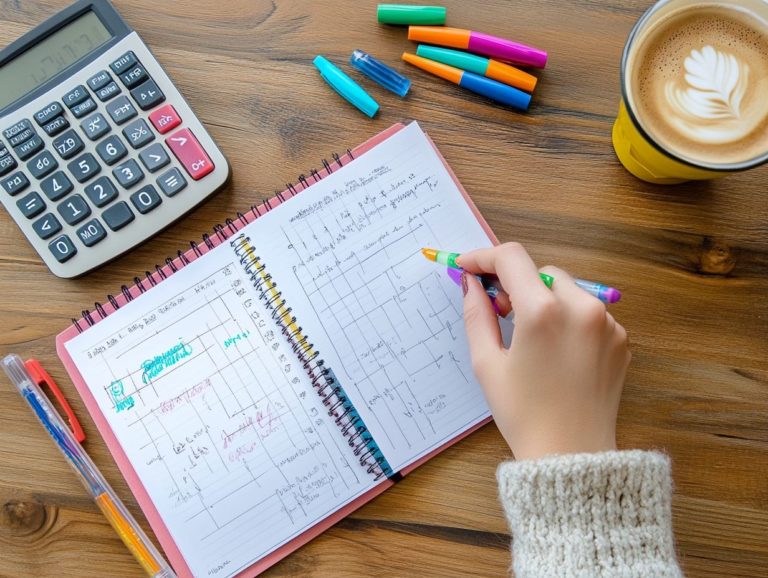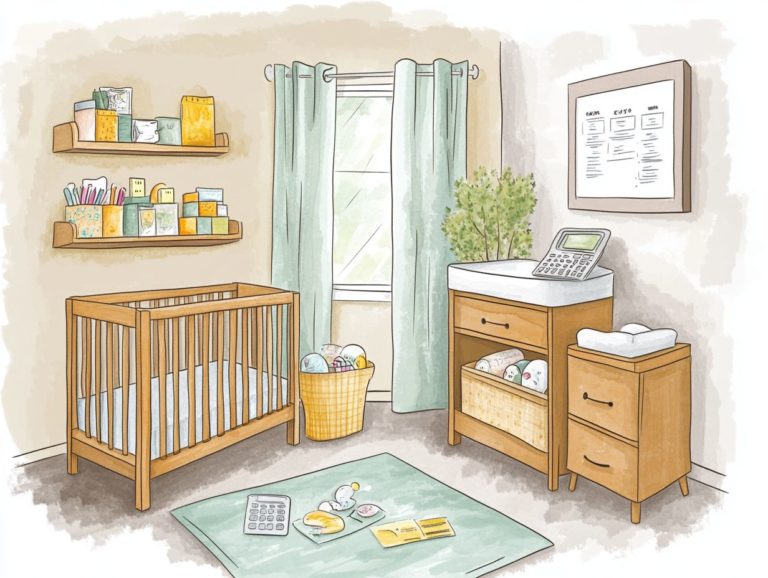How to Use Spreadsheets for Budgeting
Budgeting is essential for mastering your finances. Utilizing spreadsheets can significantly elevate your approach to this task.
You ll uncover steps to craft a budget spreadsheet, track your expenses seamlessly, and employ formulas to automate calculations. This transforms budgeting into a more effortless experience than ever before.
With practical tips to boost your efficiency and accuracy, plus alternative budgeting methods at your disposal, you ll discover the strategy that aligns perfectly with your needs.
Take charge of your finances now with the power of spreadsheets!
Contents
- Key Takeaways:
- What is Budgeting and Why Use Spreadsheets?
- Creating a Budget Spreadsheet
- Tracking Expenses with Spreadsheets
- Unlocking the Power of Formulas for Smarter Budgeting!
- Tips for Effective Budgeting with Spreadsheets
- Alternative Budgeting Methods
- Frequently Asked Questions
- What are spreadsheets and why are they useful for budgeting?
- How do I create a budget using spreadsheets?
- Can I use spreadsheets for both personal and business budgeting, like household expenses and retirement savings?
- What are some benefits of using spreadsheets for budgeting, including budgeting apps and online tools?
- Are there any templates or pre-made spreadsheets available for budgeting, such as online templates and wikiHow resources?
- Can I use spreadsheets for long-term budgeting to manage my cash flow effectively?
Key Takeaways:

- Budgeting with spreadsheets allows for customized, organized tracking of expenses and financial goals.
- Spreadsheets automate calculations with formulas and functions, saving time and ensuring accurate budgeting data.
- Maximize budgeting efficiency by regularly reviewing your spreadsheet budget and exploring alternative budgeting methods.
What is Budgeting and Why Use Spreadsheets?
Budgeting is a valuable financial planning tool that helps you manage your income and expenses precisely. It enables you to achieve your money goals while preparing for unexpected costs.
By using a budget spreadsheet to track and categorize these financial elements, you gain a clear overview of your financial situation. This paves the way for enhanced money management and effective savings strategies.
A well-designed spreadsheet offers valuable insights through its calculations, leading to improved cash flow and the financial freedom you desire.
Creating a Budget Spreadsheet
Crafting a budget spreadsheet is crucial for mastering your financial management. It gives you a clear visual of your income, expenses, and savings in an organized format.
Whether you choose Microsoft Excel or Google Sheets, a structured spreadsheet allows you to categorize both fixed and variable expenses and align your spending with your financial aspirations.
Step-by-Step Guide
A step-by-step guide to creating a budget spreadsheet leads you through essential components for effective budgeting. This includes identifying your income sources and categorizing your expenses.
This process clarifies how much money is flowing in and where it’s allocated. It also establishes a strong framework for tracking your financial health over time. Start by outlining all your income streams, such as salaries, freelance earnings, or passive income.
Next, list your necessary expenses, covering fixed costs like rent and utilities and variable ones such as groceries and entertainment.
Using Excel to organize this information enhances clarity. You can use simple formulas to automate calculations for totals and differences. This makes adjustments easy. Integrating budgeting tools provides deeper insights, enabling you to monitor your spending habits and savings goals efficiently.
Tracking Expenses with Spreadsheets

Tracking expenses through spreadsheets is a critical practice for anyone aiming to establish an effective budgeting strategy. It offers enhanced financial oversight of your household expenses, helping you stay aligned with your spending goals.
By diligently recording every payment and categorizing them, you gain valuable insights into your financial landscape. This approach allows you to pinpoint spending trends that could influence your overall budgeting tactics, paving the way for greater financial clarity and control.
Start today and transform how you manage your money!
Organizing and Categorizing Expenses
Organizing and categorizing your expenses is essential for effective budgeting. It helps you distinguish between fixed expenses, like rent, and variable expenses, such as entertainment.
This clarity plays a significant role in managing your personal finances. By clearly defining these categories, you can craft a more comprehensive financial picture that not only helps you track your spending habits but also deepens your understanding of your financial health.
This strategic organization allows you to recognize patterns in your expenditures, leading to more informed financial decisions. Understanding the significance of different budget categories aligns with principles of consumer protection, ensuring you are enabled to manage your resources wisely and guard against overspending.
Knowing where your money goes can empower you to make choices that prioritize your long-term financial well-being.
Unlocking the Power of Formulas for Smarter Budgeting!
By utilizing formulas and functions in your budgeting spreadsheets, you can automate calculations and enhance your financial management efficiency.
This method also helps you comprehensively assess your financial landscape, enabling precise calculations of your total income, expenses, and savings. As a result, you can maintain accurate financial records and confidently work toward achieving your broader financial aspirations.
Automating Calculations
Automating calculations in your budgeting spreadsheets is an excellent strategy for streamlining the budgeting process. It reduces manual errors and enhances your overall financial picture.
By leveraging advanced features within budgeting tools, you can seamlessly integrate data inputs, allowing for real-time updates and comprehensive oversight of your financial health. This approach not only minimizes the risk of human error but also lets you make on-the-fly adjustments based on dynamic conditions such as changes in income or unexpected expenses.
Automation enables you to establish recurring transactions and set alerts, ensuring you remain on top of your financial commitments without getting bogged down by manual tasks. As a result, effective budgeting transforms from a tedious chore into a proactive strategy that helps you achieve your financial goals.
Tips for Effective Budgeting with Spreadsheets

Start implementing effective budgeting tips now! Your money management skills will skyrocket, guiding you toward your financial goals in a seamless and intuitive way.
By tailoring your budgeting strategies to align with your unique lifestyle and needs, you can confidently navigate the complex world of personal finance.
Maximizing Efficiency and Accuracy
Maximizing efficiency and accuracy in your budgeting spreadsheets is crucial for gaining a clear financial overview and successfully reaching your financial goals.
Incorporating regular updates ensures that the information remains relevant and accurately reflects any recent financial changes. Clear categorization of expenses and income will further enhance your understanding of where your money is allocated, enabling you to make more informed decisions.
Utilizing templates can streamline your budgeting process, allowing you to set up categories and calculations effortlessly instead of starting from scratch. For more tips on enhancing your budgeting skills, check out how to use budgeting worksheets effectively. Remember, the precision of your calculations is vital; even minor miscalculations can distort your overall budget and impact your strategic financial planning and objectives.
Alternative Budgeting Methods
Exploring alternative budgeting methods can provide you with valuable insights into various financial strategies, enabling you to select the approach that best aligns with your personal finance needs.
Notably, zero-based budgeting, where every dollar is allocated to expenses or savings, and the 50-30-20 method, which suggests using 50% of your income for needs, 30% for wants, and 20% for savings, emerge as particularly effective frameworks. To enhance your budgeting experience, you may want to explore how to use budgeting apps. These approaches guide your financial decisions and steer you toward the ultimate goal of financial freedom.
Comparing Different Approaches
Comparing different budgeting approaches allows you to determine which strategy aligns best with your financial goals and money management preferences.
By evaluating options like the envelope system, zero-based budgeting, or the 50/30/20 rule, you can uncover the strengths and weaknesses inherent in each method. For example, while the envelope system promotes disciplined spending, it might prove cumbersome if your income fluctuates.
On the other hand, the zero-based approach offers a clear view but could feel overly restrictive for some. In a zero-based budget, every dollar is assigned a job to prevent overspending.
It’s essential to reflect on your personal circumstances, including income stability and spending habits, to find a budgeting strategy that strikes the right balance between accountability and flexibility.
Frequently Asked Questions

What are spreadsheets and why are they useful for budgeting?
Spreadsheets are computer programs used for organizing and manipulating data in rows and columns. They are useful for budgeting because they allow you to input and track financial information in a structured and organized manner.
How do I create a budget using spreadsheets?
To create a budget using spreadsheets, start by listing all of your income sources and expenses in separate columns. Then, use formulas to calculate totals and compare them to your budget goals.
You can also use formatting tools to make your budget visually appealing and easy to read.
Can I use spreadsheets for both personal and business budgeting, like household expenses and retirement savings?
Yes, spreadsheets are versatile and can be used for both personal and business budgeting. You can create separate spreadsheets for each budget or use different sheets within one spreadsheet to keep your personal and business finances organized.
What are some benefits of using spreadsheets for budgeting, including budgeting apps and online tools?
Some benefits of using spreadsheets for budgeting include the ability to easily track and update your finances, and the option to create multiple scenarios to see how different factors may affect your budget.
Budgeting apps are software tools you can use on your phone or computer to track your expenses and plan your finances.
Are there any templates or pre-made spreadsheets available for budgeting, such as online templates and wikiHow resources?
Yes, there are many free budgeting templates and pre-made spreadsheets available online for download. These templates can be customized to fit your specific budgeting needs and can save you time and effort in creating a budget from scratch.
Can I use spreadsheets for long-term budgeting to manage my cash flow effectively?
Absolutely, spreadsheets are great for long-term budgeting as they allow you to easily track and adjust your budget over time. You can also use features like conditional formatting to visualize your progress and make informed decisions about your finances.
Download a free budgeting template today and start your journey toward financial freedom!






